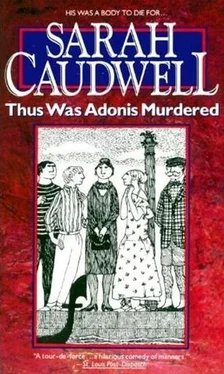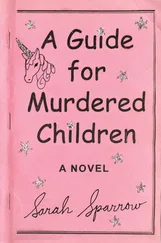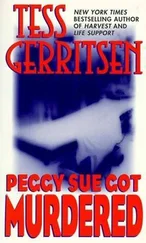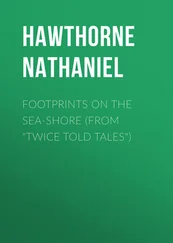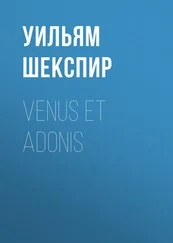“By all means,” said Selena. “But there isn’t anyone obvious.”
“Oh surely,” said Timothy. “Statistics show, I gather, that if one is going to be murdered it will probably be by one’s spouse or lover. Presumably there’s no doubt, in Ned’s case, that that means Kenneth Dunfermline? It’s difficult to imagine any other reason why two such dissimilar young men should be travelling together.”
The possibility that Kenneth had committed the crime had long since occurred to me. But I had misgivings: Venice is a sophisticated and cosmopolitan city — her police force, I felt, would not take a less than worldly view of Ned’s connection with Kenneth, nor would they be unfamiliar with the criminal statistics. I feared, if they did not regard Kenneth as the obvious suspect, that they must have some excellent reason not to suspect him at all.
The public address system announced the arrival of the flight from Venice. We began to give closer attention to the stream of returning passengers.
“They won’t be out for ages,” said Cantrip. “They’ll have to hang about for their luggage to come through on that turntable thing.”
But it was only a few minutes later that we caught sight of a rather subdued little group which seemed to correspond to Julia’s description of the Art Lovers: a handsome, middle-aged woman, whose figure had that unyielding symmetry achieved only by a substantial corset; a muscular young man, sombre of feature; a pretty girl with pale blonde hair; and, close beside her, another young man, square-shouldered, who gave the impression of a certain aggressiveness towards the world.
“I say,” asked Cantrip, “do you think that’s them?”
“Certainly,” said Selena. “Those labels on their hand luggage — they’re the same kind as the travel agents gave Julia. But where’s the Major?”
“I think,” said Timothy, “that the Major must have undertaken to act as porter. If he’s collecting all their suitcases from the conveyor belt, that would explain how the rest of them have got through Customs so quickly. It looks as if they’re coming up here to wait for him.”
The Art Lovers came up the staircase and through the door of the bar. At our first unobstructed view of the American girl, Ragwort gave what sounded almost like a whistle. We regarded him with surprise: Ragwort is notoriously unsusceptible.
“The dress,” said Ragwort, “is Yves St. Laurent. The shoes and handbag are Gucci. The scarf is Hermès. And if that young woman,” said Ragwort, admiration for her elegance contending with puritan disapproval of its cost, “is wearing a penny less than six hundred pounds on her back, I’ll be — I shall be very much surprised.”
The Art Lovers sat down several tables away, too far for us to hear any conversation between them. Not that it would have been informative: apart from telling Stanford what they would like from the bar — at any rate, he went off there and returned with a tray of drinks — they hardly exchanged a word: it was plainly not a festive gathering.
Better placed than they for this purpose, we perceived before they did the arrival in the area below of a tall man pushing a loaded baggage trolley: he was deeply suntanned; he had a white moustache; he was wearing Bermuda shorts.
“Ah,” said Cantrip, “there’s the Major.”
The scholar must miss no occasion for acquiring knowledge, no matter how suddenly and briefly it arises. “Quick, Cantrip,” I said, “get down before them and see if you can get their addresses from the luggage labels. Pretend you think your suitcase might be on the Major’s trolley.”
For any enterprise savouring of the illicit, Cantrip is the man. He did not pause to argue the proprieties. By the time the Major’s waving hand had attracted the attention of his fellow Art Lovers, Cantrip, slipping like a needle through the crowd, was already crouched beside the trolley.
The Major said something. Cantrip said something. Watching, we followed without difficulty the gist of their remarks: the Major was telling Cantrip that his suitcase was not on the trolley; Cantrip, with a nicely judged impression of imperfect sobriety, was insisting on making sure.
The first of the Art Lovers to join them was Kenneth Dunfermline, who showed a perfect indifference to their argument. He took the suitcase offered him by the Major and walked rather slowly away. He was a powerfully built young man, and the suitcase not unduly large: the weight of it, I thought, unless filled with granite, could not alone account for his dragging step and the weariness of his movements. But whether it was grief alone or some yet greater burden that weighed so heavily on the sculptor’s muscular shoulders — that was a question beyond Scholarship to determine.
The next to reach the trolley was Eleanor Frostfield. Again, though we could not hear what was said, Eleanor’s opinion of drunken young men who had mislaid their luggage, and apparently could not even remember whether it was a pigskin suitcase or a canvas holdall, was entirely clear to us. Cantrip, looking apologetic, persisted in his search.
Eventually, though glancing back suspiciously, the Major lifted two suitcases from the trolley and escorted Eleanor towards the taxi rank. Cantrip, completing his researches, sensibly continued to wander in apparent search for his luggage. He was scribbling surreptitiously on the cuff of his shirt — a sacrifice on the part of the homme bien soigné which might not, I think, have been made by Ragwort.
The return of the Major from the taxi rank coincided with the Americans’ arrival beside the trolley. Stanford was already carrying a valise, presumably containing his wife’s Venetian acquisitions; but he lifted, without apparent difficulty, two large pigskin cases and carried them towards the exit. Marylou lingered to say something, no doubt a few words of thanks and farewell, to the Major. Then she followed her husband. The only luggage remaining on the trolley was a large, rather battered suitcase and a small canvas holdall: the Major, after a few moments, picked them up and walked briskly away. Cantrip returned to the bar.
“Did you get all the addresses?” I asked anxiously. “Yes,” said Cantrip. “And I saw something jolly funny, too. Bet you can’t guess.”
“Don’t let us guess,” said Selena. “Tell us.”
“You know that holdall thing the Major went off with? Well, it’s not his. It belongs to the Revenue chap.”
“How very odd,” said Selena. “Are you sure?”
“Of course I’m sure. It had his name on the label. Edward Watson, with the same address as the sculptor chap. And what I think is,” said Cantrip, striking an uncharacteristic note of high morality, “when a chap’s been done in, it’s a bit off for some other chap to start nicking his luggage.”
Reflecting on the curious conduct of the Major, justly condemned by Cantrip as unbecoming to an officer and gentleman, we made our way to the airport restaurant and there ordered lunch. Selena, as she had promised, read to us the most recent letter from Julia.
My room at the Cytherea.
Monday night.
Dearest Selena,
I do not for a moment question the excellence of your advice — it is as religion with me. I do rather wish, however, that I had asked you just how long one is supposed to keep up this hopes, dreams and aspirations business. You will recall that I have, effectively, only eight days in Venice, of which four have now elapsed. Should it turn out that the process of lulling into a false sense of security requires a minimum of a fortnight — but no, if it were so, you would have told me.
What I mean is that a point presumably arrives at which one stops admiring the young man’s fine soul and noble intellect — or rather, of course, still admires them tremendously, but admits that one’s admiration is tinged with just the faintest soupçon of carnality. And the question which perplexes me is how I am to know, in relation to the enchanting Ned, when that point has been reached.
Читать дальше
